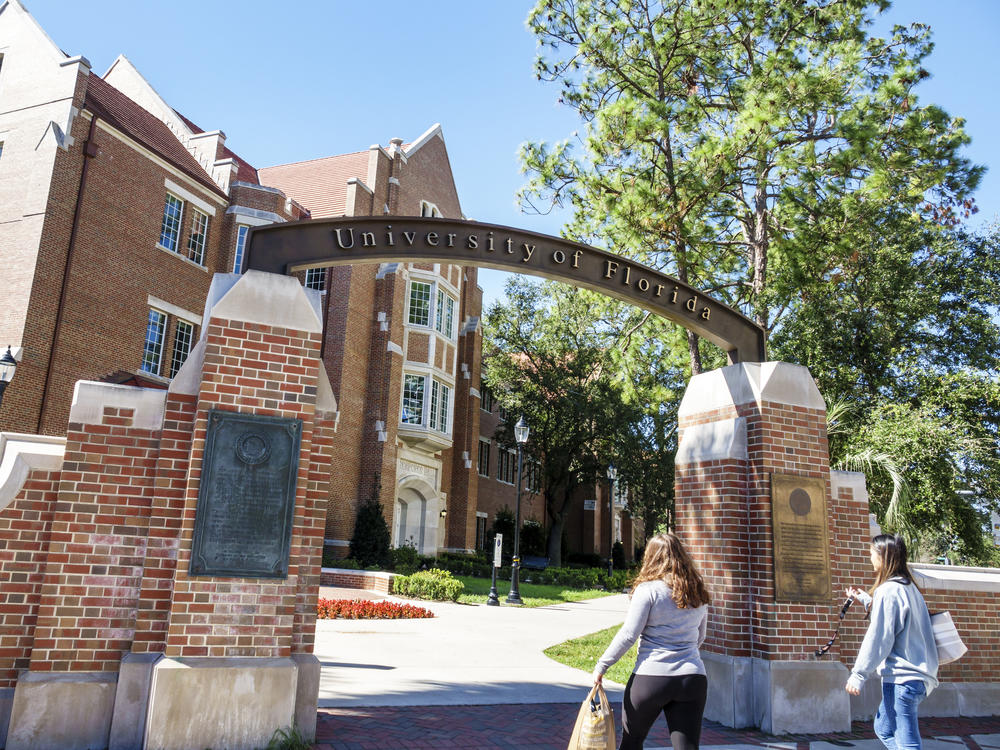Section Branding
Header Content
The University of Florida bars professors from testifying in a voting rights case
Primary Content
Updated October 31, 2021 at 10:38 AM ET
Three University of Florida professors were denied permission from the school to testify in a major voting rights case against the state, documents filed in federal court show.
The plaintiffs in the case, which was filed in May, are a coalition of voting rights organizations that are suing Florida Secretary of State Laurel Lee. The groups argue that a new state law, which severely limits the ability to vote through a drop box or vote by mail in the state, discriminates against voters of color and violates the Voting Rights Act.
Gov. Ron DeSantis signed S.B. 90 into law in the first week of May, at an event that allowed no local reporters but was streamed live by Fox News. Republicans say the law is needed to protect "election integrity and transparency." Lee has filed a motion to dismiss the lawsuit.
As part of the testimony, the plaintiffs were seeking three professors from the university — Dan Smith, Michael McDonald and Sharon Austin — to testify as expert witnesses. All three specialize in voting rights and behavior and election law.
How the University of Florida responded
The documents filed Friday, though, reveal that the University of Florida denied all three professors permission to testify, saying it was a "conflict of interest" — marking a departure from normal procedure and bringing up a concerning limitation of free speech.
The professors' requests to appear as expert witnesses were filed through the university's conflict of interest office, which requires faculty to "report any outside activities and interests." Guidance from the university shows that serving as an expert witness is considered to receive "low scrutiny" and is "generally approved" as long as it is "not likely to adversely impact UF's interests."
Responding to McDonald and Austin's request to testify, the university said that "litigation against the state is adverse to UF's interests," according to the documents the plaintiffs filed Friday.
For Smith, the university said, "Outside activities that may pose a conflict of interest to the executive branch of the State of Florida create a conflict for the University of Florida."
The plaintiffs say that since DeSantis is the head of the state's executive branch, they intend to ask if the governor's office was involved in the university's decision.
The professors' attorney, Paul Donnelly, sent a letter to the university on Friday calling the school's decision "unacceptable."
"Faculty do not forfeit their First Amendment rights as citizens by accepting an offer of employment with UF," Donnelly wrote. "Professors Smith, McDonald, and Austin testify as expert witnesses in their fields on their own time. Their testimony does not interfere with any of their job duties. There are no conflicts of interest."
The professors' lawyer calls the decision chilling for free speech
In an interview with NPR, Donnelly said that "it's unprecedented in American history for a public institution to attempt a ban like this. ... It's chilling the exercise of free thought and speech."
Donnelly's letter asks the university to reverse its decision. But even if it doesn't, the original decision to deny permission is already grounds for a strong violation of the First Amendment, Margaret Russell, a professor of law at California's Santa Clara University, told NPR.
"There's a very long history, as long as universities in this country, of academic freedom of professors," Russell said.
"When professors are hired, they are hired for their expertise in teaching, in research," she said, "They're not just employees of the university. They are serving the public, the students, the field of academic knowledge. And in this case, a very important area of voting rights."
Russell said she's never seen a ban like this imposed; the university's decision, if maintained, would set a "disastrous" precedent of curtailing academic freedom, she said.
The University of Florida released a statement on Saturday saying it has a "long track record" of supporting free speech.
"It is important to note that the university did not deny the First Amendment rights or academic freedom of professors Dan Smith, Michael McDonald and Sharon Austin," the school said in an email to NPR. "Rather, the university denied requests of these full-time employees to undertake outside paid work that is adverse to the university's interests as a state of Florida institution."
The university has strong ties to DeSantis. The chair of the board of trustees at the school, Mori Hosseini, is an adviser to DeSantis and a major Republican donor.
Copyright 2021 NPR. To see more, visit https://www.npr.org.

